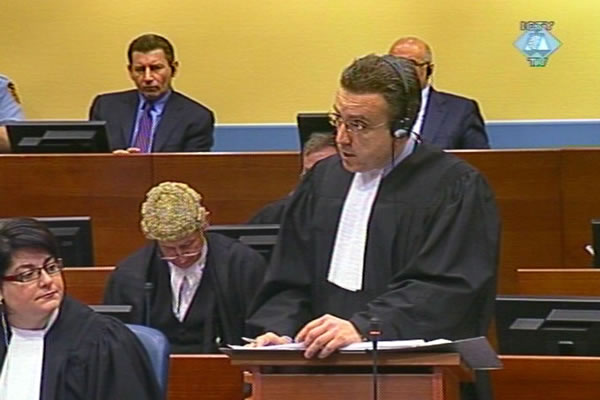Home
THIN LINE BETWEEN ‘HIGH MORALE’ AND ‘DESIRE FOR REVENGE’
Defense counsel Luka Misetic and prosecution military expert Reynaud Theunens disagreed today over what General Ante Gotovina meant when he said at the Brijuni meeting that he had soldiers in his units who were ‘difficult to keep on a leash’. Misetic and Theunens argued if it meant that the soldiers’ morale was high or that they wanted revenge
 Luka Misetic, defense attorney for Ante Gotovina
Luka Misetic, defense attorney for Ante Gotovina In his expert report, prosecution military expert Reynaud Theunens wrote that immediately before Operation Storm, General Gotovina was aware of the ‘bad reputation’ of some of his subordinate soldiers’. Theunens corroborated this claim with a quote from the transcript of a meeting between President Franjo Tudjman and the Croatian Army leadership at Brijuni on 31 July 1995. General Gotovina told the president that he had men among his troops who were ‘ready to fight’ and it was ‘difficult to keep them on a leash’.
In the cross-examination today, defense counsel Misetic implied that Gotovina’s words at that meeting didn’t mean that he was aware of soldiers being ‘problematic’. It meant, Misetic maintained, that they had ‘high morale’ and that they were eager to fight to liberate Krajina. Theunens replied that high morale was a good thing. However, he noted, a good commander had to be extra careful if the morale was ‘very high’ because there was a ‘thin line between high morale and desire for revenge’.
Gotovina’s defense counsel then tendered into evidence a series of documents in an effort to prove that the accused general strove to prevent crimes and punish perpetrators. One of the documents is Gotovina’s order from 10 August 1995, where he demands that looting, arson and threats to lives of people in the liberated areas stop, calling for ‘vigorous measures’ against perpetrators.
The 134th Home Guards Regiment was one of the problem units. According to a military-intelligence report of 11 August 1995, ‘the chain of command doesn’t function’ and soldiers ‘systematically loot and burn down houses’. In his effort to prove that the accused general tried to solve this and problems in other HV units, the defense counsel showed a report from a meeting of the Split Military District command. Gotovina said that he would force some soldiers ‘to sleep in houses they burned down’ in winter. Theunens didn’t comment extensively on Gotovina’s words, merely noting that the document didn’t show if this threat referred to Croatian soldiers in BH or in Krajina.
A document drafted by Operational Group West, subordinated to Gotovina, was shown in court. The document orders the 'discharge from service of individuals or groups' of the 134th Home Guard Regiment whose behavior 'disrupts order and discipline’. The witness noted that this was the 'key issue' but the presiding judge interrupted him saying that the Trial Chamber already knew that in some cases the HV soldiers were punished by being discharged from their units instead of being criminally prosecuted.
The evidence of the Belgian military expert has gone on for seven working days; it will be continued on Monday. Next week Gotovina's defense counsel will complete the cross-examination. The witness will then be cross-examined by the counsel of the other two accused, General Ivan Cermak and General Mladen Markac.
Linked Reports
- Case : Gotovina et al. - "Operation Storm"
- 2008-11-26 DEFENSE DENIES GOTOVINA’S LINK WITH MILITARY POLICE
- 2008-11-25 ‘OPERATIONAL’ AND ‘PROFESSIONAL’ CHAIN OF COMMAND
- 2008-11-24 PROSECUTION: GOTOVINA ‘INCITED’ CRIMES BY DOING NOTHING
- 2008-12-01 GOTOVINA’S AUTHORITY OVER THE HV(O)
- 2008-12-02 WITNESS: ’CERMAK DIDN’T COMPLAIN’
- 2008-12-03 CONTROVERSIAL OTP MEETINGS
